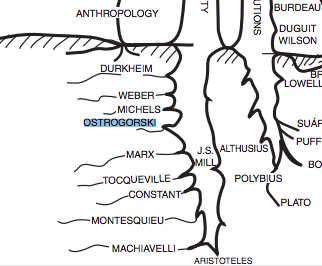
Moisiei Ostrogorski (1854-1921) was a Belarusian politician, legal history scholar, historian and political scientist who greatly contributed to the study of political and legal systems in transition from autocratic states.
Although nearly unknown in Belarus, he is widely regarded as a founder of political sociology, alongside with Max Weber and Robert Michels, and as a 'pioneer of generalisations in comparative government'.
Biorgaphy
Ostrogorski was born and grew up in the Hrodna region which he represented as a member of the First State Duma (Parliament of the Russian Empire) later in his life.
He studied at the faculty of law at St Petersburg State University, where he also edited legal periodicals and briefly worked for the Imperial Ministry of Justice. In his late twenties Ostrogorski went to study at École Libre des Sciences Politiques (Sciences Po) in Paris under its founder Émile Boutmy. In 1885 he completed his dissertation on the origins of universal suffrage.
After his studies in France he extensively researched political parties in the United States and Britain and spent many years in both countries during the 1880s and 1890s. Ostrogorski published a number of articles on political parties in French and American academic journals.
Having spent almost 20 years living abroad, Ostrogorski returned to the Russian Empire after the 1905 revolution to implement his theoretical knowledge into practise. As a political activist he organised in Hrodna the first ever primary election in the Russian Empire, which then included not only Belarus but also Poland, Finland ;and Baltic states. They took place on 6 January 1907 and were attended by around 1,400 people of approximately 2,000 people eligible to vote.
He was elected to represent the Hrodna region in the parliament of the Russian Empire, the State Duma, where he became the most active MP from the Belarusian lands and one of the most active MPs overall.
Academic Legacy
As a legal history scholar he published one of the first treatises on the rights of women The Rights of Women: A Comparative Study in History and Legislation. The treatises examined the legislation of different countries on political and public rights of women.
During the last years of his life Ostrogorski worked at the department of state law in the faculty of social sciences of Petrograd State University. As a teacher for many years he supported the Hrodna Pedagogical Society which subsequently elected him in 1913 as an honorary member.
In his major work, Democracy and the Organisation of Political Parties he follows the evolution of political systems from traditionalist to democratic. By comparing political systems of different states, Ostrogorski analyses the transition processes and formulates patterns of transition processes.
Ostrogorski on the Family Tree of Comparative Politics (click to enlarge)
Source: Philippe Schmitter, The Nature and Future of Comparative Politics, European Political Science Review, Volume 1, Issue 01, March 2009, p 38 (web)
Ostrogorski and Transition Studies
In Ostrogorski’s view democracy is more than just 'popular control of the government' or 'rule by the majority'. Every government relies on opinion, and the crucial question is whether that opinion is determined by 'prejudice and sentiment crystallised in tradition' or by 'reason asserting itself in discussion'.
Ostrogorski emphasises the need to bridge the gap between civil society and state by raising the political culture of the society, securing a pluralism of individual opinions. In his view this helps to secure the strength of the state and the stability of a given society.
Using comparative methods, he analyses the transition from authoritarianism to democracy and the possible failures at this stage. Ostrogorski demonstrates how representatives of a certain party or a group may turn from the servant of people into their master when they become too independent.
Despite his fame in the West, his personality and legacy remain almost unknown in Belarus and other countries of the former Soviet Union.
His findings on participatory democracy, particularly the role of political parties, became especially relevant in a post-Soviet context where societies are struggling to transition from authoritarianism to democracy in the absence of a well-developed political culture.
Read more
Rodney Barker and Xenia Howard-Johnston, The Politics and Political Ideas of Moisei Ostrogorski, Political Studies, Volume 23, Issue 4, pages 415–429, December 1975 (web).
Андреев , И. В., М. Я. Острогорский — депутат I Государственой думы от Гродненской губернии, Белорусский Сборник. Статьи и материалы по истории и культуре Белоруссии, Российская Национальная Библиотека, Санкт-Петербургская Ассоциация Белорусистов, Санкт-Петербург, 2003 (web).
Москалюк, Анастасія Борисівна . Критична теорія політичних партій Мойсея Острогорського: автореферат дисертації на здобуття наукового ступеня кандидата політичних наук, 2012 (web).






